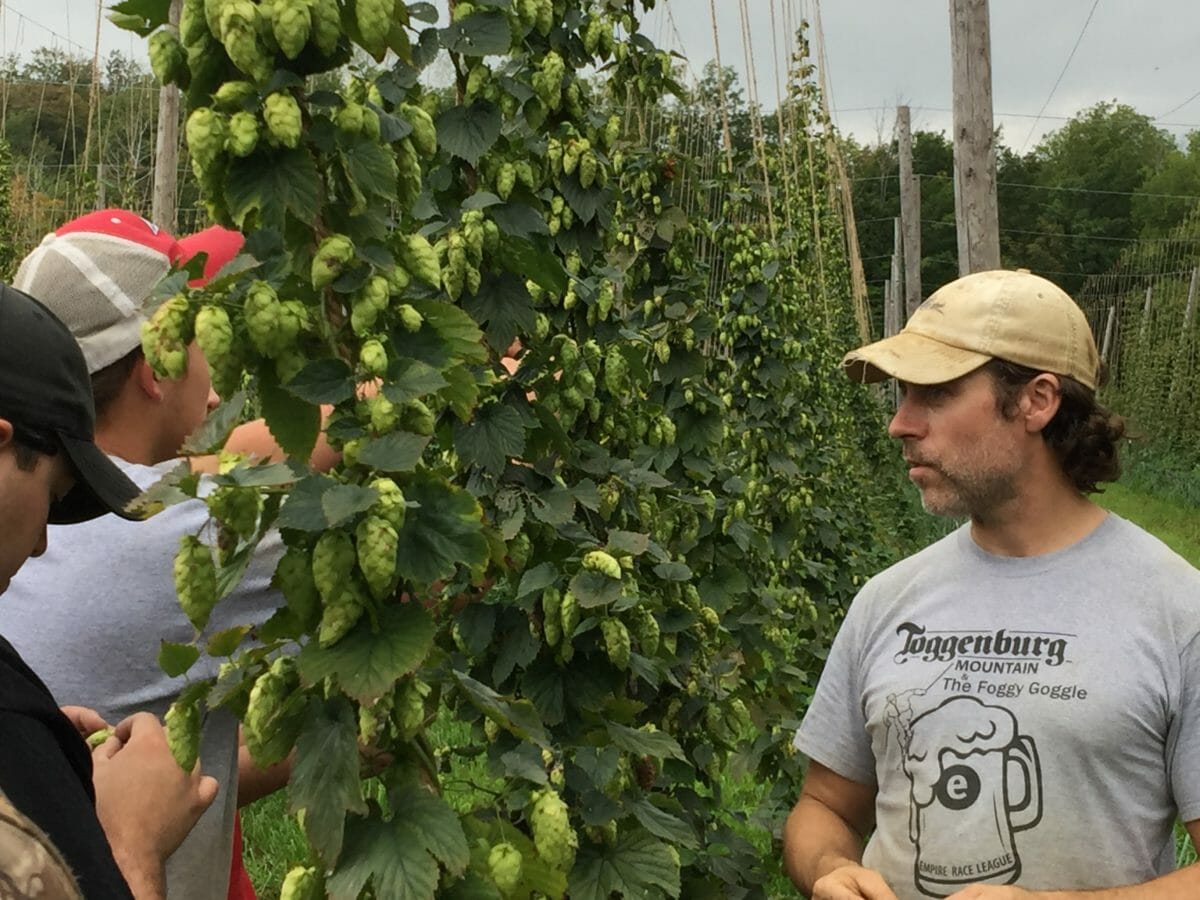New York Farmers Hope To Discover New Hops
The state has seen a mini-resurgence of hop growing in recent years, but its farmers face stiff competition from west coast growers when it comes to hop varieties.
New York Farmers Hope To Discover New Hops
The state has seen a mini-resurgence of hop growing in recent years, but its farmers face stiff competition from west coast growers when it comes to hop varieties.

Chad Meigs and his hops. The Bineyard
New York hop farmers are looking to discover wild varieties of the aromatic plant to try to stay competitive with growers in the Pacific Northwest.
In the 19th century New York was the center of the hop growing industry in North America, until a blight of downy mildew devastated many of the area’s hop farms. The state’s commercial hop farms peaked around 1890 when they produced 21 million pounds of dried hops from 40,000 acres.
After prohibition closed down New York’s breweries, the industry moved west to Idaho, Washington and Oregon, where around 97 percent of America’s hops are still grown today.
New York has seen a mini-resurgence of hop growing lately thanks to the explosive popularity of craft beer, as well as recent state legislation that has provided incentives to breweries for buying local ingredients. But growing hops in New York is still not without its challenges. One of the largest hurdles its growers face is that they are unable to grow some of the more sought after varieties of hops that have been bred and trademarked by growers in the Pacific Northwest.
To counteract this issue, hop farmers in New York have been participating in a project run by the state’s chapter of the Northeast Hop Alliance, which has been looking to identify feral and wild hops to potentially trademark as their own.
The project, long-windedly called Advancing New York’s Hop Industry with Unique Varieties and Quality Assurance, has been collecting hops found growing on area farmers’ properties. The hops are then sent away for a DNA test to verify they are unique varieties. They are also analyzed for their beer producing quality and whether they have disease resistance.
“We’ll get some unique flavours that brewers will get to use, versus simply just what’s available in the trade already,” said Steve Miller, the executive director of the Northeast Hop Alliance, who is overseeing the project.
New York growers say many brewers are looking to brew New England-style India Pale Ales with proprietary hops such as Mosaic and Citra, which has made it hard to sell certain public varieties they have grown.
“Breweries are looking for those hops and they don’t really understand how to make a beer similar to the New England-style IPA with our local ingredients,” said Chad Meigs, who has been growing hops on his farm — the Bineyard — in Cazenovia, NY, for nine years.

Meigs found a feral hop on his property after a hunter knocked on his door a few years ago to tell him he saw hops growing in his woods. He is now waiting to get results back from the project to see if it is a unique variety.
The program launched last year after it received $33,000 in funding from the New York Farm Viability Institute. Miller said the project has 15 clones that are currently being analyzed. Some of the hops discovered through the project are already in the process of being trademarked, but Miller could not say how many.
A normal plant breeding program for hops can take eight to 10 years and require large sums of money. But the current project will shrink the usual time and money needed to develop new varieties, as it is evaluating wild seedlings.
Miller said farmers first assumed that the feral hops were plants that had been grown on farms in the 19th century. However, all the plants they have tested so far have been seedlings and therefore genetically unique.
In 2013, New York state started issuing what are called farm brewery licenses to breweries that agreed to use a certain percentage of locally grown ingredients in their beer. These new licenses provided incentives, such as letting breweries serve draught beer in glasses. Growers say this helped spark some more sales, but it can still be a struggle to sell one season’s harvest within a couple years.
“It is hard to move hops sometimes,” said Meigs.
“Our customers are our customers because they like our hops. They like to use local ingredients and they know how to use them. They aren’t buying from us because they have to.”
Some New York hop farmers think the wild hop project will give them a bit more of a competitive edge. At the very least it should give them new hope and fresh hops, that they can call their own.
Follow us
This work is licensed under a Creative Commons Attribution-NoDerivatives 4.0 International License.
Want to republish a Modern Farmer story?
We are happy for Modern Farmer stories to be shared, and encourage you to republish our articles for your audience. When doing so, we ask that you follow these guidelines:
Please credit us and our writers
For the author byline, please use “Author Name, Modern Farmer.” At the top of our stories, if on the web, please include this text and link: “This story was originally published by Modern Farmer.”
Please make sure to include a link back to either our home page or the article URL.
At the bottom of the story, please include the following text:
“Modern Farmer is a nonprofit initiative dedicated to raising awareness and catalyzing action at the intersection of food, agriculture, and society. Read more at <link>Modern Farmer</link>.”
Use our widget
We’d like to be able to track our stories, so we ask that if you republish our content, you do so using our widget (located on the left hand side of the article). The HTML code has a built-in tracker that tells us the data and domain where the story was published, as well as view counts.
Check the image requirements
It’s your responsibility to confirm you're licensed to republish images in our articles. Some images, such as those from commercial providers, don't allow their images to be republished without permission or payment. Copyright terms are generally listed in the image caption and attribution. You are welcome to omit our images or substitute with your own. Charts and interactive graphics follow the same rules.
Don’t change too much. Or, ask us first.
Articles must be republished in their entirety. It’s okay to change references to time (“today” to “yesterday”) or location (“Iowa City, IA” to “here”). But please keep everything else the same.
If you feel strongly that a more material edit needs to be made, get in touch with us at [email protected]. We’re happy to discuss it with the original author, but we must have prior approval for changes before publication.
Special cases
Extracts. You may run the first few lines or paragraphs of the article and then say: “Read the full article at Modern Farmer” with a link back to the original article.
Quotes. You may quote authors provided you include a link back to the article URL.
Translations. These require writer approval. To inquire about translation of a Modern Farmer article, contact us at [email protected]
Signed consent / copyright release forms. These are not required, provided you are following these guidelines.
Print. Articles can be republished in print under these same rules, with the exception that you do not need to include the links.
Tag us
When sharing the story on social media, please tag us using the following: - Twitter (@ModFarm) - Facebook (@ModernFarmerMedia) - Instagram (@modfarm)
Use our content respectfully
Modern Farmer is a nonprofit and as such we share our content for free and in good faith in order to reach new audiences. Respectfully,
No selling ads against our stories. It’s okay to put our stories on pages with ads.
Don’t republish our material wholesale, or automatically; you need to select stories to be republished individually.
You have no rights to sell, license, syndicate, or otherwise represent yourself as the authorized owner of our material to any third parties. This means that you cannot actively publish or submit our work for syndication to third party platforms or apps like Apple News or Google News. We understand that publishers cannot fully control when certain third parties automatically summarize or crawl content from publishers’ own sites.
Keep in touch
We want to hear from you if you love Modern Farmer content, have a collaboration idea, or anything else to share. As a nonprofit outlet, we work in service of our community and are always open to comments, feedback, and ideas. Contact us at [email protected].by Alex Robinson, Modern Farmer
July 25, 2019
Modern Farmer Weekly
Solutions Hub
Innovations, ideas and inspiration. Actionable solutions for a resilient food system.
ExploreExplore other topics
Share With Us
We want to hear from Modern Farmer readers who have thoughtful commentary, actionable solutions, or helpful ideas to share.
SubmitNecessary cookies are absolutely essential for the website to function properly. This category only includes cookies that ensures basic functionalities and security features of the website. These cookies do not store any personal information.
Any cookies that may not be particularly necessary for the website to function and are used specifically to collect user personal data via analytics, ads, other embedded contents are termed as non-necessary cookies.